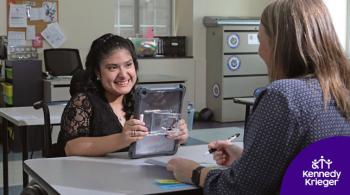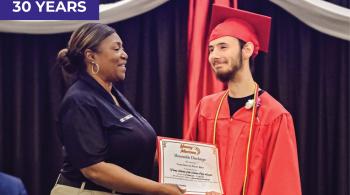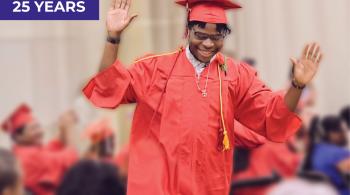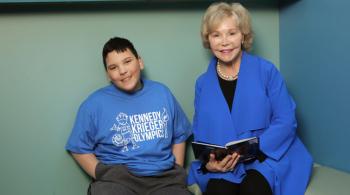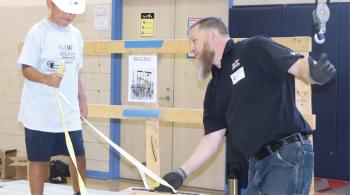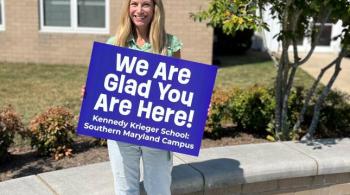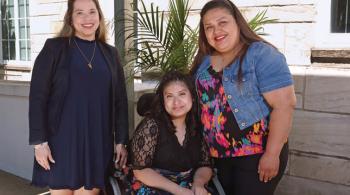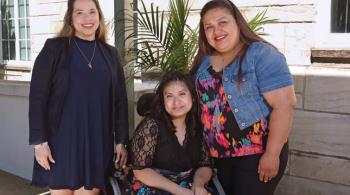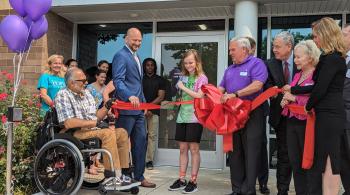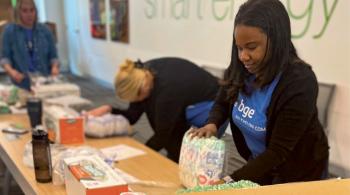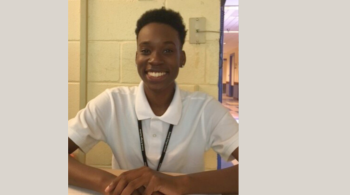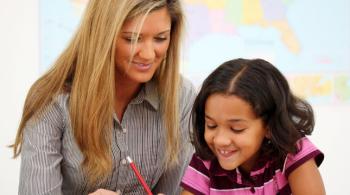By Laura Thornton
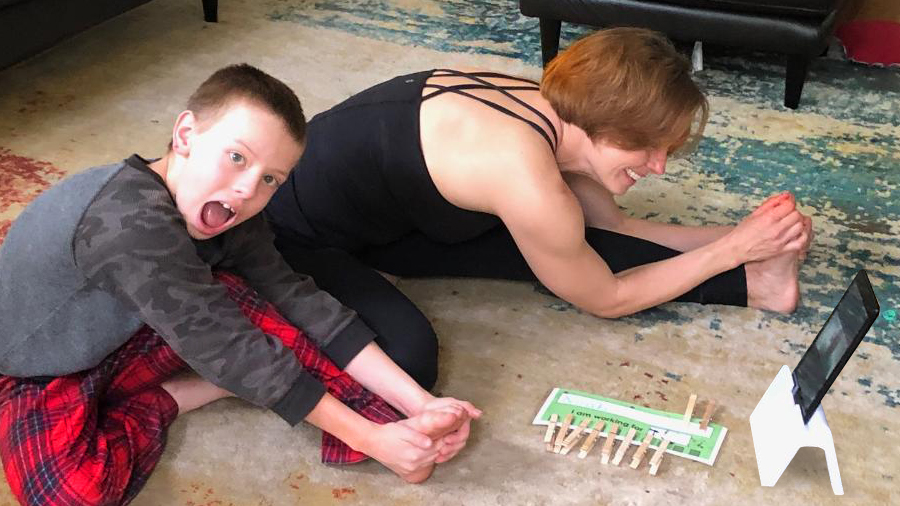
Noah, 11, has autism spectrum disorder. Before he began attending school at Kennedy Krieger Institute’s Montgomery County Campus last year, he often felt angry. But within a few months of switching schools, he’d made a dramatic change for the better. As his behavior improved, he began to truly shine in his schoolwork.
“I’m so proud of my child and am in awe of what the school has accomplished,” says his mom, Tracy.
Noah, who—like every student attending Kennedy Krieger School Programs—has an individualized education program (IEP), continues to make strides during the pandemic. Since late March, his classes have been held remotely, and he is loving his virtual meetings with his teacher, Alyse Marselle. When they were virtually reunited, he was so happy that he kissed the iPad he was using.
“He loves seeing his teachers on Zoom,” Tracy says. “It’s really important for him to know they’re still there for him, and it’s comforting for him to see Ms. Alyse. Even with the virtual lessons, he’s engaged.”
The fact that Noah has been able to continue to make progress with his communication during distance learning—that’s a big deal.”
– Alyse Marselle, teacher at Kennedy Krieger's Montgomery County Campus
During distance learning, Marselle posts assignments and a video lesson every morning to Noah’s virtual classroom. She also meets with Noah once a week, as well as with Tracy, to talk about what’s working—and what needs tweaking—for Noah. Marselle is also available via email to Tracy and her other students’ parents and caregivers, at any time. “I’m in constant contact with my students’ families. I’m trying to make sure that every parent has the information they need for their child to be successful.”
While each of Marselle’s students—there were eight elementary school students in her class this past spring—receives, for the most part, the same assignments, she gives each student and family individual modifications. For Noah, who is mostly nonverbal, that has meant figuring out different ways to communicate during virtual meetings. Noah uses a variety of methods, including American Sign Language and an iPad, to communicate, and he and Marselle quickly figured out that they could also use a text feature in the videoconferencing platform to communicate during virtual meetings.
“The fact that Noah has been able to continue to make progress with his communication during distance learning—that’s a big deal,” Marselle says.
Noah is also receiving his school-based occupational and speech therapies virtually. Marselle is in close collaboration with his therapists, and with the therapists of her other students, to ensure that lessons and therapies complement each other and help each student progress toward their goals.
“It’s been so awesome to see the progress Noah has made since he started with us last year, even without being in the school environment since March,” Marselle says. “He’s just blossomed! He seems like a different kid now, but his mom says he’s not different, and that we just brought out the real Noah.”
Marselle has found that by working more closely than usual with her students’ parents and caregivers, they’re able to learn more about the teaching methods used to help their children learn.
“Parents and caregivers are part of their child’s IEP team, but they might not always understand what we’re saying. They know what we’re talking about, but they don’t always know what that looks like,” Marselle says. With distance learning and videoconferencing, parents and caregivers are better able to more fully understand—and take part in—their children’s education.
“It’s been great for parents and caregivers to be able to see what we do, what their kids can do, and what their kids’ strengths and weaknesses are, when it comes to learning,” Marselle says. “They’ve heard it from us before, but this time they’re actually able to see it in action.”
He loves seeing his teachers on Zoom. It’s really important for him to know they’re still there for him.”
– Tracy, Noah's mom
Tracy and Noah have designed a special T-shirt for Noah and his family to wear as Noah continues distance learning. “Just because we are learning at home, doesn’t mean our new Kennedy Krieger homeschool can’t have its own swag!” Tracy says. Noah’s family members are so proud of all that Noah is accomplishing. And as Tracy has assisted Noah with distance learning, she’s seen, firsthand, her son’s progress.
“Now, he reads when he goes to bed, and he recently started learning algebra,” Tracy says. “That amazes me. He’s so smart!”

